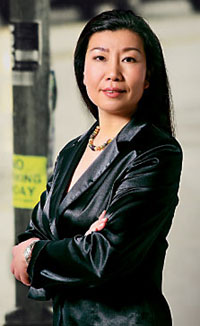Ao Jie has had a career of firsts. She was China's first four-time national foil champion, its first Asian foil champion and its first World Cup foil champion.
Ao has retired from her athletic career, but the former captain of China's women's foil team continues to break ground.

She was the first Chinese staff member of the International Fencing Federation (FIE) and the international sports federation. She is also the first and only the Chinese female international fencing referee for foil and epee.
In a sport long dominated by Europeans, Ao proved herself to be an impartial technical official. But it took a lot of hard work.
"I think my working attitude, capability and my familiarization with fencing lifted me to my current position," Ao said. "Although the fencing field used to be controlled by male officials, I left no room for others to question me as a woman."
Ao started training for athletics when she was 7. She was selected to be a foil fencer at 13.
Only three years later, Ao became the junior national champion and was named to the national team in 1984.
At the 1990 Lyon Fencing World Championships, China's women's foil team, led by Ao, claimed bronze in the team event, China's best ever result.
Referee dreams
After the 1993 China National Games, Ao decided to retire from competitive sport. She enrolled at Beijing Foreign Studies University to learn French, the official language of the fencing world. It was the first step in her long-term plan to become a referee.
"I'm the only one that was doing sport in my family since my mother is a teacher at university and my father is an engineer," Ao said. "When I was an athlete, I never gave up studying, and entering university was always my aim. Then I chose to learn the working language of fencing and my goal at that time was to be an international referee."
After graduating in 1997, Ao worked at the Beijing Sports Bureau for a while but was soon given an opportunity to continue her language studies in France.
"At that time, Beijing was bidding for the Olympic Games and the sports authorities wanted to push more Chinese into international sports federations. I got the chance due to my basic language ability in French," Ao recalled.
Ao originally went to France to improve her language skills, but after a year she decided that was not enough. She eventually attended a master's program at the French National Institute of Sport and Physical Education, the cradle of French sports stars.
It was initially difficult for her to adapt to life in France, but she persevered.
"While studying in France, I had to start from the very beginning and lived a totally different life from before," she said. "The difficulties even hurt my confidence a little bit, but after talking with some of my friends, I knew that if I wanted to achieve something, I had to make every effort, no matter how difficult."
She ultimately earned two master's degrees in France - one in sports economic management and the other in sports competition management.
After she graduated in 2002, Ao applied for an internship at FIE. With such an impressive resume, the president wanted to interview her in person.
"At the time, I had already been an international referee, and I'm the only female referee in Asia, so the FIE president knew me and called me for the interview," she said.
"When I was an athlete, the FIE seemed unattainable. But after studying in France, I came to know more about international practices and got closer to the fencing circle."
Her dream was finally realized when she became the first Chinese staff member of FIE in 2002. After working for two years as the president's assistant, Ao became FIE's competition manager in 2004 and also the director of FIE training center in Asia.
Judging dispute
Fencing originated in Europe and European fencers have traditionally dominated the fencing hall. At the 2004 Athens Olympic Games, for example, a European referee was stripped of his judging rights during the men's team foil final. The incident led to the introduction of a camera system to oversee the judging process.
Such controversies make a judge like Ao all the more welcome. Her impartial and impersonal working attitude has won her respect from other referees, coaches and athletes alike.
As FIE's competition manager, Ao is currently in charge of organizing the competitions, training and testing referees and sending them and their supervisors to competitions.
For the upcoming Beijing Games, Ao has promised it can expect fair fencing competitions.
"The judging environment in fencing has been greatly improved," she said. "I believe at the Beijing Games all the referees will work with impartiality."